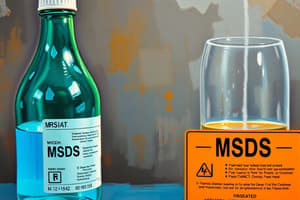Podcast
Questions and Answers
What is the correct method to convert milligrams to grams?
What is the correct method to convert milligrams to grams?
- Multiply by 1000
- Divide by 1000 (correct)
- Multiply by 10
- Add 1000
What is the wavelength of a transition from n=5 to n=1 state?
What is the wavelength of a transition from n=5 to n=1 state?
- Wavelength cannot be calculated without additional data
- Long wavelength due to low energy transition
- Wavelength is dependent on the mass of the particle
- Short wavelength due to high energy transition (correct)
What is the correct scientific notation for the diameter of a carbon atom, approximately 0.000000000340 m?
What is the correct scientific notation for the diameter of a carbon atom, approximately 0.000000000340 m?
- 3.40 × 10^-12 cm (correct)
- 3.40 × 10^2 pm
- 3.40 × 10^-12 km
- 3.40 × 10^-10 m
Which measurement is equivalent to exactly 1 cubic meter (1 m³)?
Which measurement is equivalent to exactly 1 cubic meter (1 m³)?
What is the required measurement to record if the balance reading is 0.40012 g?
What is the required measurement to record if the balance reading is 0.40012 g?
Which piece of glassware is most suitable for measuring a precise volume of liquid?
Which piece of glassware is most suitable for measuring a precise volume of liquid?
Based on the measurements provided (12.62 mL, 12.60 mL, 12.71 mL, 12.57 mL), how would you calculate the average?
Based on the measurements provided (12.62 mL, 12.60 mL, 12.71 mL, 12.57 mL), how would you calculate the average?
What does the Rydberg formula calculate?
What does the Rydberg formula calculate?
Flashcards are hidden until you start studying
Study Notes
Safety and Material Safety Data Sheets (MSDS)
- MSDS (now called SDS) are available in two locations: on a bulletin board and in each lab room.
Data and Measurements Recording
- Record measurements to one decimal place beyond the least precise measurement.
- For example, if the balance reads 0.40012 g, record it as 0.400 g
Unit Conversions
- To convert from mg to g, divide by 1000.
Heating and Handling Crucibles
- Use crucible tongs to remove a hot crucible from the clay triangle on a ring stand.
Measurement Length
- Using the provided image, the length measurements are:
- 8.5 cm.
- 3.3 in.
- 0.085 m
Lewis Structures and Geometry
- NH3 (ammonia) has a tetrahedral electron geometry.
Wavelength Calculation
- The wavelength of the n=5 to n=1 transition:
- Use the Rydberg equation: 1/λ = RH [(1/nf^2) - (1/ni^2)]
- RH (Rydberg constant) = 1.0974 x 10^7 m^-1
- nf (final energy level) = 1
- ni (initial energy level) = 5
- Solve the equation to find λ (wavelength).
Density Calculation
- The density of titanium is 4.50 g/cm3.
Scientific Notation
- The diameter of a carbon atom in scientific notation is 3.40 x 10^-10 m.
Volume Conversion
- 1 m^3 is equivalent to 10^9 cm^3.
Precise Liquid Volume Measurement
- Use a volumetric flask to measure a precise volume of liquid.
Data Analysis
- For the given measurements: 12.62 mL, 12.60 mL, 12.71 mL, and 12.57 mL
- The average is 12.625 mL
- The relative percent deviation is 0.10% for each measurement.
Studying That Suits You
Use AI to generate personalized quizzes and flashcards to suit your learning preferences.




